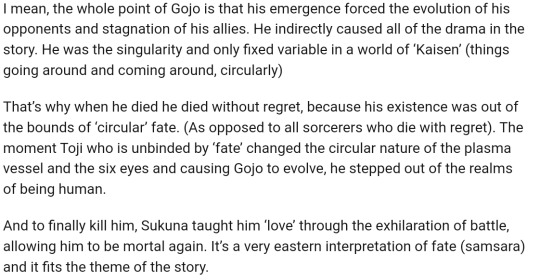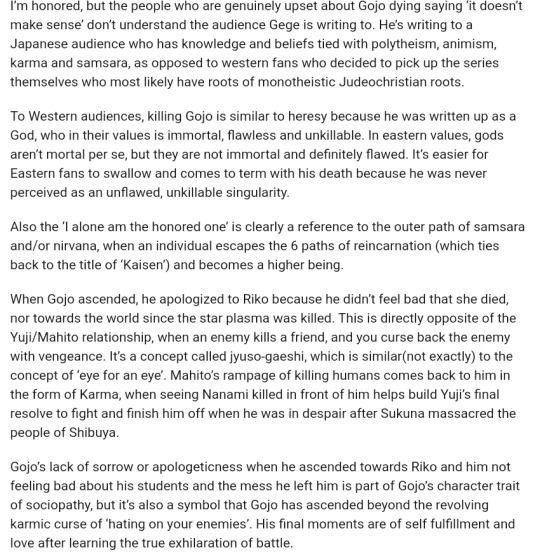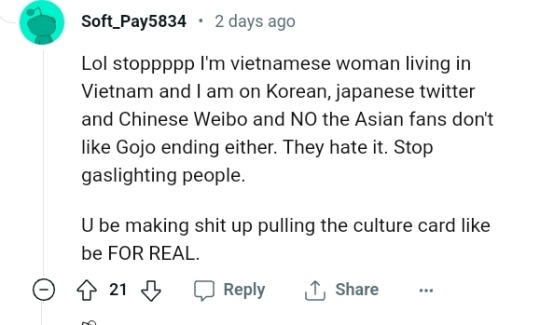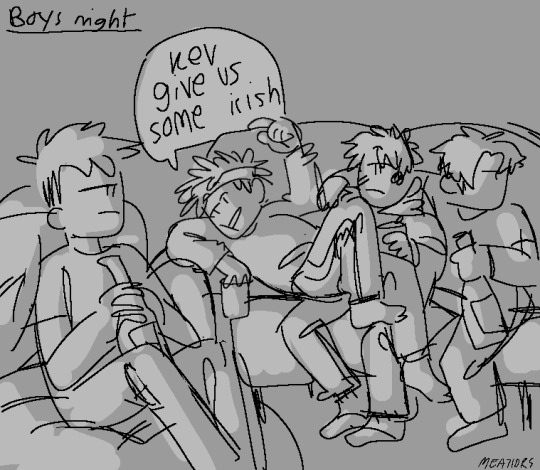#High and low culture
Text
Every now and then I think about how subtitles (or dubs), and thus translation choices, shape our perception of the media we consume. It's so interesting. I'd wager anyone who speaks two (or more) languages knows the feeling of "yeah, that's what it literally translates to, but that's not what it means" or has answered a question like "how do you say _____ in (language)?" with "you don't, it's just … not a thing, we don't say that."
I've had my fair share of "[SHIP] are [married/soulmates/fated/FANCY TERM], it's text!" "[CHARACTER A] calls [CHARACTER B] [ENDEARMENT/NICKNAME], it's text!" and every time. Every time I'm just like. Do they though. Is it though. And a lot of the time, this means seeking out alternative translations, or translation meta from fluent or native speakers, or sometimes from language learners of the language the piece of media is originally in.
Why does it matter? Maybe it doesn't. To lots of people, it doesn't. People have different interests and priorities in fiction and the way they interact with it. It's great. It matters to me because back in the early 2000s, I had dial-up internet. Video or audio media that wasn't available through my local library very much wasn't available, but fanfiction was. So I started to read English language Gundam Wing fanfic before I ever had a chance to watch the show.
When I did get around to watching Gundam Wing, it was the original Japanese dub. Some of the characters were almost unrecognisable to me, and first I doubted my Japanese language ability, then, after checking some bits with friends, I wondered why even my favourite writers, writers I knew to be consistent in other things, had made these characters seem so different … until I had the chance to watch the US-English dub a few years later. Going by that adaptation, the characterisation from all those stories suddenly made a lot more sense. And the thing is, that interpretation is also valid! They just took it a direction that was a larger leap for me to make.
Loose adaptations and very free translations have become less frequent since, or maybe my taste just hasn't led me their way, but the issue at the core is still a thing: Supernatural fandom got different nuances of endings for their show depending on the language they watched it in. CQL and MDZS fandom and the never-ending discussions about 知己 vs soulmate vs Other Options. A subset of VLD fans looking at a specific clip in all the different languages to see what was being said/implied in which dub, and how different translators interpreted the same English original line. The list is pretty much endless.
And that's … idk if it's fine, but it's what happens! A lot of the time, concepts -- expressed in language -- don't translate 1:1. The larger the cultural gap, the larger the gaps between the way concepts are expressed or understood also tend to be. Other times, there is a literal translation that works but isn't very idiomatic because there's a register mismatch or worse.
And that's even before cultural assumptions come in.
It's normal to have those. It's also important to remember that things like "thanks I hate it" as a sentiment of praise/affection, while the words translate literally quite easily, emphatically isn't easy to translate in the sense anglophone internet users the phrase.
Every translation is, at some level, a transformative work. Sometimes expressions or concepts or even single words simply don't have an exact equivalent in the target language and need to be interpreted at the translator's discretion, especially when going from a high-context/listener-responsible source language to a low-context/speaker-responsible target language (where high-context/listener responsible roughly means a large amount of contextual information can be omitted by the speaker because it's the listener's responsibility to infer it and ask for clarification if needed, and low-context/speaker-responsible roughly means a lot of information needs to be codified in speech, i.e. the speaker is responsible for providing sufficiently explicit context and will be blamed if it's lacking).
Is this a mouse or a rat? Guess based on context clues! High-context languages can and frequently do omit entire parts of speech that lower-context/speaker-responsible languages like English regard as essential, such as the grammatical subject of a sentence: the equivalent of "Go?" - "Go." does largely the same amount of heavy lifting as "is he/she/it/are you/they/we going?" - "yes, I am/he/she/it is/we/you/they are" in several listener-responsible languages, but tends to seem clumsy or incomplete in more speaker-responsible ones. This does NOT mean the listener-responsible language is clumsy. It's arguably more efficient! And reversely, saying "Are you going?" - "I am (going)" might seem unnecessarily convoluted and clumsy in a listener-responsible language. All depending on context.
This gets tricky both when the ambiguity of the missing subject of the sentence is clearly important (is speaker A asking "are you going" or "is she going"? wait until next chapter and find out!) AND when it's important that the translator assign an explicit subject in order for the sentence to make sense in the target language. For our example, depending on context, something like "are we all going?" - "yes" or "they going, too?" might work. Context!
As a consequence of this, sometimes, translation adds things – we gain things in translation, so to speak. Sometimes, it's because the target language needs the extra information (like the subject in the examples above), sometimes it's because the target language actually differentiates between mouse and rat even though the source language doesn't. However, because in most cases translators don't have access to the original authors, or even the original authors' agencies to ask for clarification (and in most cases wouldn't get paid for the time to put in this extra work even if they did), this kind of addition is almost always an interpretation. Sometimes made with a lot of certainty, sometimes it's more of a "fuck it, I've got to put something and hope it doesn't get proven wrong next episode/chapter/ten seasons down" (especially fun when you're working on a series that's in progress).
For the vast majority of cases, several translations are valid. Some may be more far-fetched than others, and there'll always be subjectivity to whether something was translated effectively, what "effectively" even means …
ANYWAY. I think my point is … how interesting, how cool is it that engaging with media in multiple languages will always yield multiple, often equally valid but just sliiiiightly different versions of that piece of media? And that I'd love more conversations about how, the second we (as folks who don't speak the material's original language) start picking the subtitle or dub wording apart for meta, we're basically working from a secondary source, and if we're doing due diligence, to which extent do we need to check there's nothing substantial being (literally) lost -- or added! -- in translation?
#translation#linguistics (sorta)#I love language so much#long post#subtitling#dubbing#transformative work#if you read all the way to the end - THANK YOU I am so impressed#localisation#this is not an academic essay but I still feel bad for not citing sources#low vs high context cultures and languages are concepts from intercultural communication studies#but idk how up to date that is or whether folks even still actually use them#I know they oversimplify things#but it helped me say what I was trying to here so shrug#languages#language soup#meta#language meta#fandom meta of sorts#thanks for the help sorting this out kayla <3#my nonsense
1K notes
·
View notes
Note
cluster b culture is being the walking definition of “when they go low, i go lower”
.
#cluster b culture is#cluster b#npd#aspd#bpd#hpd#Mod Reef#anonymous#''they go low; we go high'' just gives them more room to go even lower. fuck that#they go low i'm gonna get low enough to punch them in the nuts. with my teeth. and rip them off. like an alpaca.
179 notes
·
View notes
Text
I'm still not well so this isn't going to be articulate, but I wanted to say something anyway.
In the wake of Grease: Rise of the Pink Ladies (amongst other titles) being purged from streaming I've seen countless posts saying "This is terrible, we need to stop this practice -- they might purge a good show next!" and yeah, for sure a lot of titles being impacted by streaming purges/lack of physical media/a decline in archiving right now aren't going to be remembered for changing the world.
However, I think it is vital that we fight to preserve these titles for their own sake not just because "What if next time it's something we actually like?!" There is value is preserving things widely regarded as "bad" not just because I have firm beliefs about the absurdity of taste, but because who gives a shit if something is deemed "good?" Actual human people put their time and energy into realising these artistic visions. Even if the results are arguably not "good" or "popular", should the efforts of these artists be lost to the sands of time? No, no they fucking shouldn't.
I share a lot of art on this blog from titles very few people consider culturally important or valuabe. However, I don't look at the things I collect & share like that. Even some of the most objectively absurd titles I own are still pieces of art that were developed, published, and consumed by humans in the real world. Whether they've turned out to be broadly memorable or not is irrelevant because they existed and that in itself makes them worthy of preservation so that others can choose to familiarise themselves with them long after the original creative team is gone.
So yes, we should all be trying to preserve the media that's important to us and not let corporations try to stamp out every trace of a financial (though not necessarily artistic) misstep. However, it shouldn't take the threat of something we, personally, like being taken away to stir us into giving a shit.
Even the demise of less admired works should concern us and make us start to burn copies of Grease: Rise of the Pink Ladies because it might not mean anything to you or I right now, but to some kid in 20 years it could be a seminal experience that leads them to follow their dreams. Or it could become a cult classic that people reflect on at watch parties years in the future. Or it could continue to be a footnote in the history of television that nobody really cares about.
Ultimately I don't think it matters what level of value we arbitrarily assign to media now or in the future, we should be trying to preserve as much of it as possible so that generations from now people can enjoy the option of engaging with these titles should they so wish.
#personal#idk i just feel strongly that even trash should be allowed to exist#and all of us be able to access it if we so choose#some of the most meaningful film experiences of my life have involved B movies and other “low” culture properties#i'm not well enough to even start rambling about high and low culture and the rich#but as an audience we should be able to select what we want to consume#and we should be able to access it regardless of local laws or cultural norms#that's why the efforts of archivists and media preservationists from the lost media wiki to the louvre are so important#“but this spongebob ad had no impact on society who cares if it is accessible or not?”#you can't determine the value of something based solely on your own experience with it#so yeah spongebob ads and episodes of wheel of fortune should continue to exist#and so should the trashiest shoujo manga in the world#god and i haven't even touched on how disproportionately things like this affect work by artists of colour#queer artists and disabled artists#it's super fucking shit and i refuse to let streaming take away these media choices#ok back to my covid sick bed
109 notes
·
View notes
Photo

I don't make a particular distinction between 'high art' and 'low art.' Music is there for everybody. It's a river we can all put our cups into and drink it and be sustained by it.
- John Williams
Two legends around the piano. John Williams and Ray Charles jam together, 1980.
#williams#john williams#quote#music#art#composer#composition#arts#culture#ray charles#high art#low art#sound#film#movies#cinema
182 notes
·
View notes
Text

"And the princess and her prince lived happily ever after"
#high&low the worst#todoroki#tsuji#shibaman#Todoroki is gonna make sure his boys get some culture damnit#Todoroki's friday bookclub
68 notes
·
View notes
Text
if im ever being overly loud about being catholic i promise that's just the rent control gunshot to remind the protestants in the room that I'm not one of them
#like how my gf goes from being ex catholic to being catholic as soon as a protestant opens their mout#i go from being low key catholic to high key catholic when i feel like certain ppl are getting too comfortable#this goes for current and former protestants btw#especially the former ones who think cultural christianity doesnt exist
20 notes
·
View notes
Text
Departing from my habit of only posting about Farscape to post about Scorpius to say: it's been several days and I'm still thinking about how romantic it was that John was singing a scottish folksong to himself while he was looking for Aeryn in that one episode. Nothing could possibly be more romantic for these specific characters than a folk song about how you'll never be in a specific place with your love again and I'm so serious.
#you take the high road and i'll take the low road and i'l be in scotland before you...#like. WHAT a usage of john's viewing the world primarily through cultural references. my god.#farscape
24 notes
·
View notes
Text
That said it IS really fun to think about how fashion would differ in Kryta compared to how it actually is. With things like class, religion, and immigrant cultures all having clear influences on how people would dress (just like real life!)
#girlbob.txt#gw2#i was specifically thinking about canthan-krytan fashion and how it would change between high class and low class#current idea being that high class follows things like current chinese street fashion trends#while lower class has a counter culture fashion consisting of looser shirts tight belts and asymmetry#not sure tho it was just an idea seeing as i'm not skilled enough to draw what i want#for concept arts
12 notes
·
View notes
Text
Being semi verbal feels like my first language isn't English and I can barely speck it and form together sentences with mouth words (and text if overwhelmed or burned out enough) , plus misunderstanding people and struggling to understand social cues and etc its like I'm a foreigner in a foreign country (or maybe even someone from a different dimension)
#actually autistic#disability#actuallyautistic#actually disabled#aac user#semi speaking#semi verbal#autizzy#neurodiversity#neurodivergence#neurodivergent#actually neurodivergent#autistic experiences#autistic problems#autistic adult#autistic culture#actually autism#autism spectrum#high tech aac#low tech aac#aac device
29 notes
·
View notes
Text
I don’t think there’s anything wrong with enjoying particular types of art more than others, but the knee jerk disdain people have towards modern art is disappointing…
I think u have to be ok with not connecting to everything that u see. That’s just fine. Art is like food and there’s going to be some stuff that just doesn’t work for u regardless of if it’s objectively well done or not. There’s a flavour of anti-intellectualism and inferiority complex that seems to accompany ppls hatred of modern art, this discomfort that they “don’t get it” when that’s like. Actually fine. Some stuff u will appreciate once u learn context and others, regardless… u just won’t! I still hate beans & legumes
That being said I also have friends who would rather order the same mac & cheese at a restaurant every single time than risk getting something they won’t enjoy — or won’t enjoy as much. But art costs u very little to try in comparison, so why not try it?
#the other part is stuff like rothkos just works way better in person than on a screen. True of all art but especially true of these big#pieces with such delicately crafted sensory experiences. Also if art makes u uncomf or disdainful that’s also an elicited reaction.#Why do u feel that way? What cultural reasons might cause u to think of it that way? anyways everybody should read blue period.#I personally don’t think there’s rlly anything different between “low art” or “high art”. Ppl get insecure abt what they rlly like or#something and it bleeds into this ‘us’ vs ‘them’ mentality… it’s true we should ask who’s art is curated and preserved and for what reasons#but like. Humanity is humanity. It’s up to you if you want to listen. I just think it’s a shame to turn away before u give it a chance#That being said I’m still a basic Impressionism bitch. Show me a pretty oil painting landscape and I go nuts.#bytebun rambles#I am just talking. Whatever#U can know art history and read badly translated yaoi webnovels. Multiplicity.#to delete
8 notes
·
View notes
Text
聊237有些群众的反应 // On some of the comments re: CH237
This post touches on Jujutsu Kaisen Chapter 237. It also touches on Buddhist philosophy and ideas.
Right. So seeing strawman arguments popping up since CH236 is to be expected.
There's one that pissed me off from the "My Country Mangaka, Right or Wrong" crowd, though. This one:
---

Now. This is the sort of post I actually like reading, even if our opinions differ. I like seeing other people's interpretations of a work. I love meta, especially because it appeals to my compulsively analytical brain.
But one still gotta be aware that they are applying a very specific reading to excuse Gege's execution, right?
One still gotta be aware that this doesn't excuse nor explain glaring storytelling issues, right?
All of that paragraph merely justifies the need to have Gojo out of jujutsu society, which honestly? Most of us already agreed, mai brutha.
I personally predicted Gojo would be out because of his Buddha allegory—if he's enlightened, then he should be the last 6 Eyes user. "This is the last birth; there will be no more re-becoming."
Whether that means the only way for him to go out is death... that's already grounds for reasonable debate. I mean, if Yuki's dream of removing everyone's curse energy comes true, Satoru will still be the last 6 Eyes user. And he'll also get to be just Ken Gojo-Satoru-the Not-Weak-Not-Strong-Mortal-Dude. Hell, it even ties shits up in a neat thematic bow while cementing Yuki's (well-deserved) importance in the story.
Last but not least: "samsara" does NOT mean fate. Gosh, maybe the person who posted this was trying to explain it in ways they believed the "Western audience" would understand, but... that's a tad patronizing, don't you think?
Samsara does not mean fate. Buddhism itself is opposed to fatalism, as seen in its opposition to the Ājīvika school (which is one of the six Śramaṇa schools Buddhists debated way back then). Instead, Buddhists believe in causal determinism.
Ironically, the dude's explanation of "kaisen" as "cyclic" is itself a good proxy for the meaning of samsara. Samsara means "cycles of existence", and it's got nothing to do with fate. Nope, "karma" does not mean fate either. It doesn't even constitute fate in a Buddhist's conception (karma means "action").
---
But this person has more takes, man. When met with a cheeky response saying they are "Gege's alt account", they have this to say:

Here's the part that starts to piss me off.
Do I think Jujutsu Kaisen has a lot of Buddhist motifs, philosophy, religious ideas, etc. baked into its backbone, to the point that some of them fly over non-Buddhists' heads? Yes.
Sure, I'm also not someone who studies Buddhist philosophy for my major (my major was my darling cognitive science). I simply read up on them for no reason beyond curiosity and intrigue. And agreement, sure. I agree with many of its tenets. Ya know, like when people agree with absurdism and Kantian ethics and stoicism and whatnot. It's actually why I'd die on the hill of Satoru being self-less. I simply think the concept of anatta flew over a large group of JJK enjoyers' heads, and that's fine. Those who get it explain them to those who don't. No big deal. Someday I'll talk about anatta and sunyata as concepts exemplified by Satoru, too.
Do I think there are Japanese cultural ideas flying over non-Japanese's heads? Yes, that's likely to be true.
I'm not Japanese. I'm just some person growing up in a Chinese-dominant family in a multicultural Southeast Asian society. Even then I'm quite sure I miss out on a lot of implied Japanese cultural phenomena when I consume their stories.
But how does any of that even translate to justifying shitty execution in this story, including Gojo's death? Are you saying Japanese people will lap this up because, to them, this is "not bad storytelling" but "a Japanese cultural thing lost in translation"?
Are you serious?
And what the hell is with that strawman of "Western audience"? "Killing Gojo is heresy because something something Gojo is God something perfect unkillable flawless"?
Yo, who the hell actually believes Gojo is "god"? All I see are people connecting Gojo with the Buddha himself, which is a legitimate connection anyway. I'm sure those who genuinely see Gojo as a god-in-flesh are a minority who probably, I don't know, take the story sideway to some hardcore fanon territory.
Most of us are not arguing against taking Gojo out because "the audience only knows Judeo-Christian ideas so this is heresy." Most of us are just arguing that the story hasn't been written well lately. Most of us are just pointing out Gege's lackluster-to-subpar execution and other storytelling issues.
Also, if we are supposed to argue this through the this-is-way-too-Buddhist-for-yall defense, then I would have loved it if this person pointed out what this "singularity" concept in Buddhism itself is.
Because as far as I know, there is no such thing as a constant in Buddhist philosophy. One of the Three Marks of Existence is deadass "Anicca" (impermanence). The point is "nothing is constant /permanent. Permanence is an illusion." The cycle of samsara itself changes constantly.
So how does Satoru being "a singularity" actually make sense in an argument hinging on Buddhist ideas?
Also, for someone who rags on others for missing out on Buddhist ideas, dude also made the mistake of taking Satoru's lack of reaction and remorse to Riko's death as "a trait of his sociopathy" much like one not familiar with Buddhism might.
No. It doesn't show sociopathy. Just as "rising above the cycle of hating your enemies" ain't some strange "juxtaposition" to Satoru's sociopathy either. These two traits are from the same source.
What that alludes to, sir/ma'am/dude, is simply "Upekkhā", or equanimity.
Believe it or not, even Buddhists are cautioned against mistaking "equanimity" with "apathy". Apathy is a "near enemy" in the sense that it superficially represents equanimity when it is not; the latter is related to "non-attachment" and "renunciation".
Apathy, meanwhile, occurs when one does not possess Right View.
This is what I meant when I said, yes, sometimes non-Buddhists may miss out or misunderstand. Hell, my best friend was raised in a very ardent East Asian/Chinese/Pure Land Buddhist family, and yet when I talked to her about equanimity, she thought it was the trait of a sociopath too. Really, 'tis not a crime to not get these things.
It is really irritating though if you actually act like what you say is end-all-be-all, okay?
Satoru didn't express anything when Riko died because it already happened—and there was no use being fixated on what had happened. This was fresh off his Awakening period, too, so Satoru was still in that weird state of jhāna or something, I don't know (Gege makes me doubt myself now). He's in an equanimity state, and therefore "hates no one". That's really it.
---
Gosh, the fact that I'm actually quite passionate about debunking this Redditor's statement is surprising. Honestly I never even thought I'd ramble at length about JJK at all, because it's such a large fandom with so many galaxy brains who outclass me by lightyears!
I think I'm just irate when someone touches on something I know, and expresses this weird "I know Japanese. Do you?" superiority while straw-manning anyone who disagrees with them. Like man? Respectfully, fuck off.
Another Redditor did reply to them though:

FOR REAL, SOFT_PAY5834! GET 'EM!
...Anyway, this person's reply to Soft_Pay5834 deadass mixes some Japanese in their reply, because I suppose showing off you can write Japanese or something is a legit reinforcement to your arguments now. Wow. I'm really trying hard not to call them a "w_ _ a b _ _".
So yea. Can some people please stop straw-manning any critic as Gojo dick-riders already? Or use any other strawman, for that matter? Thanks.
---
Thank you for reading my ramble. I know, it's a bit dense with a lot of links.... Hyah?
#I didn't dabble in Buddhism to argue with people!!! What happened?!#an argument over a fictional story is ironically very un-Buddhist hahahah. So yea I too get a big fat L#But I also think if I can at least provide some clarity every time someone starts to abuse the “culture” card because I have the knowledge.#I should. Besides#this is low-stakes shit. A debate with low stakes is better than one with real life high stakes.#jjk#jujutsu kaisen#jjk spoilers#jjk 237#buddhism#jjk leaks#jjk manga#gojo satoru
11 notes
·
View notes
Note
Extremely low empathy cluster b culture is seeing the ocean gate situation and not only not caring about the millionaires there, but actually cheering for things to go to shit. Literally eat the rich
.
#cluster b culture is#low empathy cluster b culture is#cluster b#npd#aspd#bpd#hpd#Mod Reef#anonymous#i don't really care either way#but i'm annoyed by the people who seem so shocked by people celebrating and/or not being sad/upset#like. bestie you're on the high intensity ''eat the rich'' website tf did you expect#the only one i can say i feel any sort of pity for is the nineteen year old because he was heavily pressured into it and 100% did not want-#--to go
91 notes
·
View notes
Text



kevin being irish is actually so fucking funny to me
#IF U KNOW U KNOW#anyways hc he was raised in ireland before they moved to the us#so he retains all the *super important* irish cultural knowledge#the horrors of catholic public school#the epic highs and lows of the gaa#bet he LOVED learning about the rising and all the politics from back then#guys irish kevin so funny and important to me ok i think about it all the time#coloniser jokes at neil#meaty art#aftg#tfc#all for the game#kevin day#matt boyd#matthew boyd#andrew minyard#neil josten#andreil#comic#digital art#my art#fanart#artists on tumblr#ibis paint x
70 notes
·
View notes
Quote
We do not pointedly prefer football to opera; we do not think it is better, more pure, more human to be poor than to be rich. We do not think it is inevitable that human kindness is more likely to be encountered in working class individuals than in middle class individuals. We do not think working class people are better than anybody else because they have been defined as belonging to one or other social category. We are not interested in working class culture...We do not celebrate the working class: working class life is rubbish, it is not a condition to be aspired to, and the past thirty 24 years of pro-revolutionary fetishisation of the proletariat as a thing in itself (the legend has it that the leftist group Militant used to force its activists to wear flat caps and donkey jackets on their paper sells so as to fit in) has mistaken and confused the actual power of the working class and reduced the proletariat to the status of just another oppressed minority.
Monsieur Dupont, Nihilist Communism, pg. 23-24
#monsieur dupont#nihilist communism#working class#working class culture#cult#low culture#rainbow high#fetishization
121 notes
·
View notes
Text
indulging in vice (daydreaming about going to oxford)
#i deserve this. after the absolute trainwreck of emotions yesterday (far too raw therapy session -> super interesting translation workshop#-> covid scare)#the highs are high the lows are low odi et amo etc etc#still reeling over that translation talk though. i love you language.#it was so so funny there were only about 15 minutes between the first two i was still sniffling and talking about puns in different cultures#give it up for the metro for managing to get me home in just 15 minutes
7 notes
·
View notes
Note
High empathy questioning npd culture is feeling werid that your empathy is super high but yet you still have most of the symptoms npd like I'm so confused help?????
.
#npd culture is#high empathy npd culture is#actually narcissistic#actually npd#narcissistic personality disorder#npd#cluster b#high empathy#tbf you can have high empathy and have npd like most people with npd will have a hard time with empathy but its not a requirement#we have fluctuating/usually low empathy and our npd symptoms holder actually had consistently high empathy for a really long time#🌃❓
26 notes
·
View notes